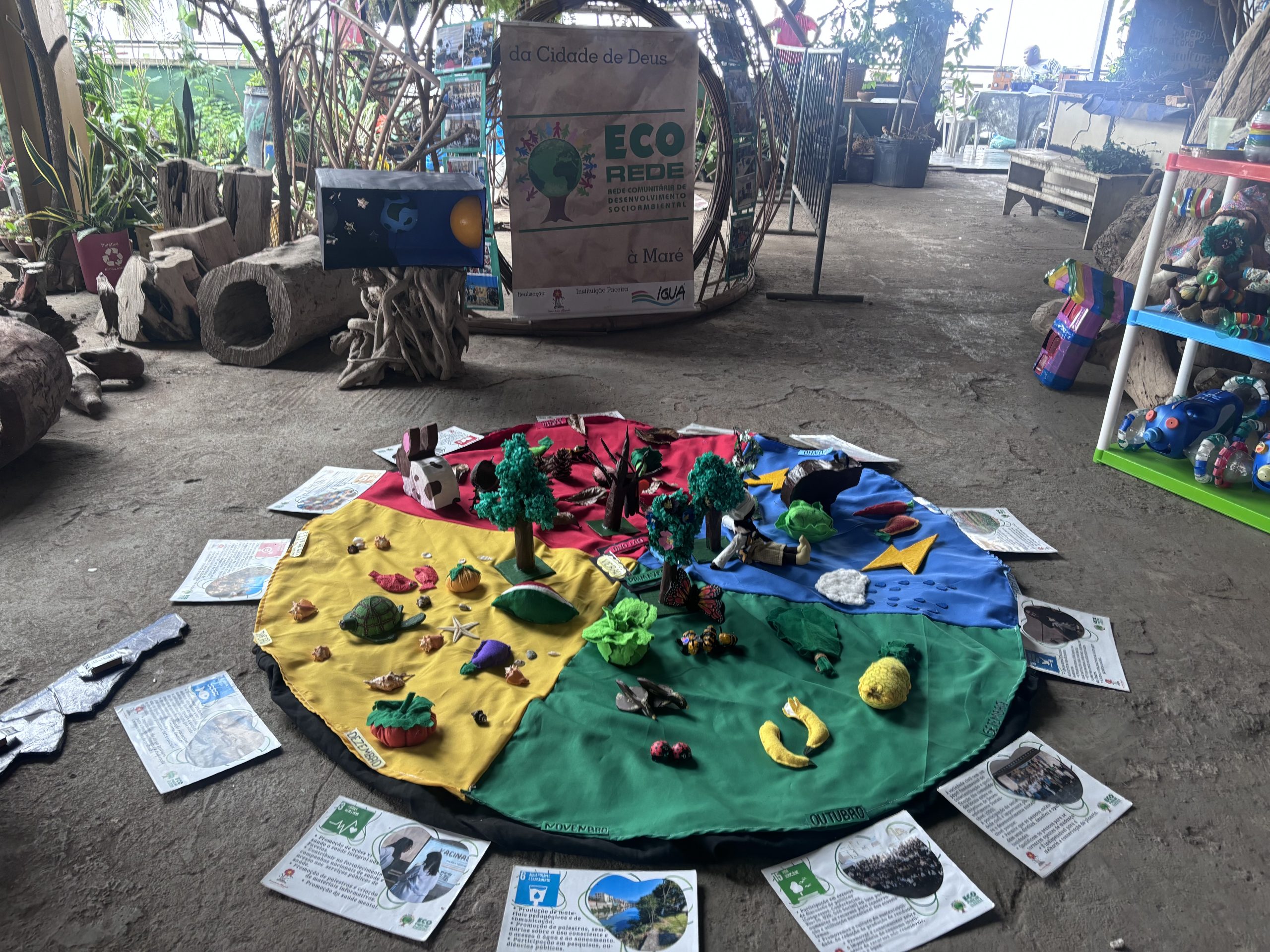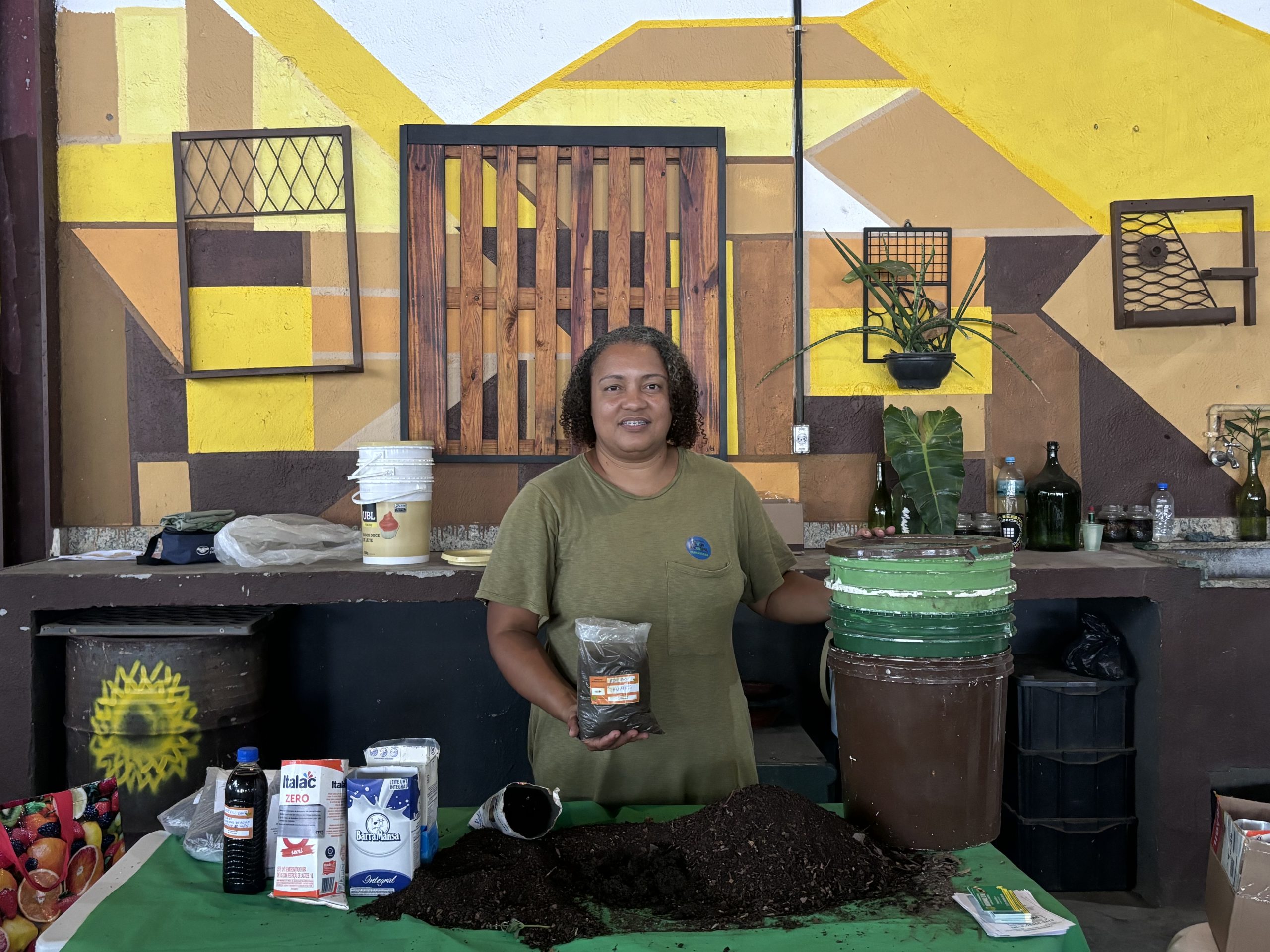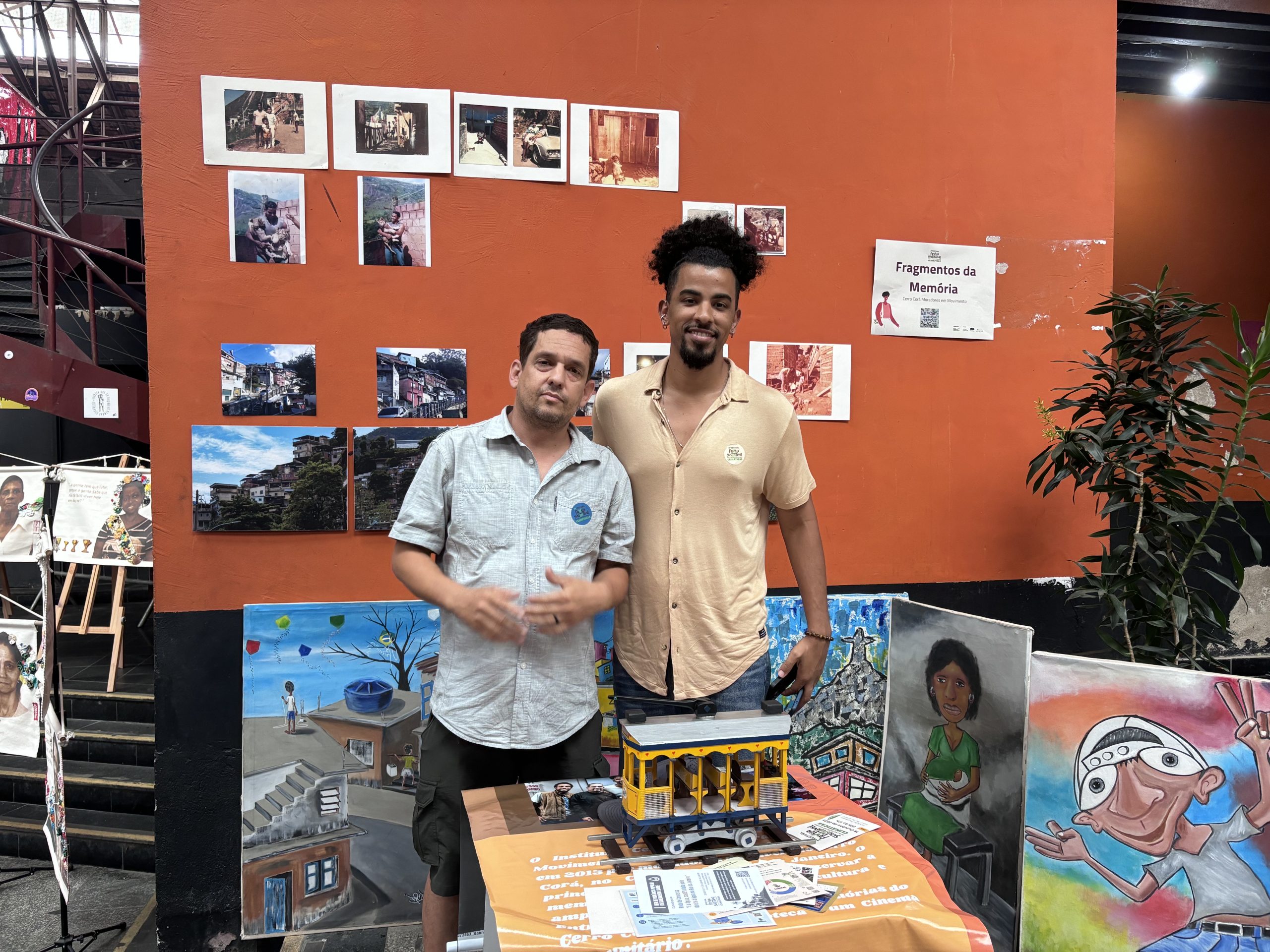This is the second of two articles complementing official coverage of the 2nd Sustainable Favela Festival. Click here for part one.
During the countdown to COP30 in Belém, the climate conference taking place in the Brazilian state of Pará, favela residents and allies from the Rio de Janeiro metropolitan region gathered for the 2nd Sustainable Favela Festival, organized by the Sustainable Favela Network (SFN)* and held in downtown Rio to share reflections, pathways and solutions to the global climate emergency. As the planet’s biomes approach points of no return, climate change will impact favelas and peripheral areas around the world with increasing intensity.
Socio-environmental Education in City of God
With this in mind, the Making/EcoRede project from City of God held a discussion circle on the “Impacts of Climate Change in Favelas and Peripheral Areas” and presented interactive material about the “Seasons of the Year and the Impact of Climate Change.”
The discussion, which brought together project members and festival attendees, challenged the discourse of those in power about the climate emergency and the tendency to blame the groups most affected by its consequences. It also explored the responsibility of large corporations for the impacts of climate change.
Iara Oliveira, activist and project coordinator, spoke about the importance of verbal communication as a tool for mitigating the effects of the crisis. Educating through verbal exchanges, she said, helps build a generation of children who see themselves as rights-bearing individuals and who have a deeper understanding of the climate crisis.
“Environmental problemas are always related to human beings forgetting that they are nature. Thinking about the environment is not just about growing produce or separating waste. It’s also about questioning who produces that waste. The world’s greatest polluters are the countries with the most money, and when they talk about climate justicethey want to blame us… There’s no sustainability in capitalism.” — Iara Oliveira
The interactive exhibition on the impacts of climate change on the seasons was presented with the pedagogical materials used in the project’s activities, which currently operates in 27 schools in favelas and peripheral areas. Through an interactive mat, project members showed the natural changes of each ecosystem throughout each season of the year. Building on this, they explained how changes in climate affect the natural life cycles of fruit-bearing and animal species in their respective ecosystems, highlighting in particular how these changes impact health and daily life in favelas.
According to Ana Vitória de Araújo, coordinator of EcoRede’s biological sector and a resident of City of God, the exercise was based on practical examples of life in the favelas. It addressed the climate by showing how excess heat affects crops and, in turn, the lives of residents, leading to food insecurity, for instance. It also addressed the effects of rain and floodingwhich compromise the respiratory health of children.
Each year, Alfazendo explores the Sustainable Development Goals (SDGs)—the 17 global objectives established by the United Nations (AND) to be achieved by 2030. In 2025, the project focuses on “Action Against Global Climate Change,” linking this theme to how favelas are affected by climate change, particularly in relation to sanitation and infrastructure.

Full-Cycle Composting in the Mangueira Favela
Motivated by the desire for collective change, Fabiana dos Anjos, from Girassol Supplies and Services and a resident of Hosefacilitated the workshop “Composting Is Giving Back to Nature What Belongs to Her: Strong Soil, Fertile Future!” Dos Anjos promotes sustainability in favelas through workshops and by selling products derived from composting.

During the workshop, dos Anjos used three buckets to build a composter alongside the participants and demonstrated how compost and organic biofertilizer are formed—a practice that nourishes the soil, prevents improper waste disposal and helps reduce greenhouse gas emissions.
She began by implementing composters in schools and this became her main focus after she noticed that organic waste was still being handled incorrectly in her community, with natural household materials simply discarded as garbage. When properly managed, these inputs can nourish the soil and generate more earth. Today, the project operates through partnerships with family and friends in Mangueira, where composters are installed in homes throughout the community. Furthermore, the biofertilizer produced by the composters is collected and sold by the project, while the compost is used by partner organizations. According to dos Anjos, this exchange benefits atypical mothers in Mangueira as well as nursing homes for the elderly.
In addition to promoting ecological literacy and fostering human and plant health, the initiative engages in horticultural-therapy activities with Divine Age Nursing Home in Magé, where elderly residents of the care home share their empirical knowledge with children. In schools, students collaborate on a vegetable patch, guided by ancestral knowledge.
“With a focus on sustainable family farming, we contribute not only to a collective understanding of sustainability, but also promote the well-being of plants and people… Today, my goal is to implement home composting in every household in the Mangueira community. I aim to bring more care, knowledge and exchanges of wisdom, and to shine a light on all our collective interactions that, over time, we tend to lose.” — Fabiana dos Anjos
Preserving Memory for Climate Mitigation in Cerro Corá
The Cerro Corá Residents in Motion project showed Fragments of Memoryan exhibition that, through photographs recording the past of the Cerro Corá favela’s environmental space and its present changes, affirms the community’s memories as a way to mitigate the impacts of the climate emergency and restores a sense of belonging among its residents. The archival images show homes from the early days of the favela’s occupation, as well as parties and dances organized by the community, situated below Christ the Redeemer, between the neighborhoods of Cosme Velho and Santa Teresa.

Ricardo Rodrigues, artist and creator, presented his paintings capturing life in the favela. He believes that memory preservation is closely linked to the environment.
“I paint memories from my childhood. I have images in my mind that are very similar to my paintings—they’re moments. I remember, with great nostalgia, carrying buckets of water after bathing in a spring in Vidigal. As a resident of Cerro Corá, I felt compelled to paint these memories: the lines to fetch water from the spring and the birdsong of the many species around my house. Participating in Memories of Cerro Corá and being able to bring my paintings along is a way to express gratitude to life for all it has allowed me to experience. Recalling these events helps me understand and convey the message that respecting the environment goes beyond caring for soil, water, fauna, and flora. We have to take care of ourselves—and when I say that, I mean collectively, taking care of each other.” — Ricardo Rodrigues
Save the date! The Sustainable Favela Network has already confirmed that the 3rd Sustainable Favela Network Festival will take place on October 17, 2026. It’s going to be even more unmissable! Mark your calendars!
This is the second of two articles complementing official coverage of the 2nd Sustainable Favela Festival. Click here for part one.
Check out the Photo Album of the Discussion Circles and Exhibitions at the 2nd Sustainable Favela Festival on Flickr:
*The 2nd Sustainable Favela Festival: Favelas at the Center of Climate Solutions is organized by the Sustainable Favela Network with the support and partnership of re:arc institute, Progress Foundry and CEDAE. Individual donors to Catalytic Communities have provided extra support, allowing the event to scale beyond initial projections. The 2025 event is also part of three other essential pre-COP agendas taking place in the city of Rio de Janeiro: the Rio de Janeiro Sustainability Turnaroundthe 15th Annual Rio Agriculture Weekand UN-Habitat’s Urban October. The Sustainable Favela Network (SFN), the Community Land Trust (CLT), and RioOnWatch are initiatives of the NGO Catalytic Communities (CatComm).
About the author: Manuela David is a journalism student with an additional focus on International Politics at PUC-Rio. In addition to her active interest in climate issues, she loves music and film.


